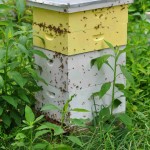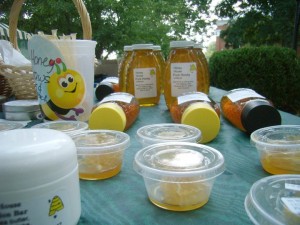Yes, our honey bees can become little criminals and steal from their neighbors! The threat of larceny is usually not great in the spring and early summer when a good nectar flow is on, but as the flow slows or stops (as occurs from time to time, especially in periods of dry weather), bees are on the lookout for any food they can find. So watch out! It is that time of year. The closest source is often a neighboring hive. Colonies with strong populations can usually defend themselves. New nucs and divides, recently captured swarms, and any hives which have not built up well or which are dwindling due to disease, pests, or other causes, are all likely targets of robbing bees. The culprits may come from your own hives, from your neighbor’s, or from nearby bee trees. Continue reading
Sign up for Phil’s email list!
Want to hear from me when I have new information, that you might be interested in? It is easy to sign up to receive my emails.
Click here to open the sign-up form in a new page. This also tells me, a little about you, when you contact me with a question.If you change your mind it is easy to unsubscribe.
You can also email me at: phil@philcrafthivecraft.com, I'm happy to respond to email questions.
Phil’s past posts by topic
- 2016 new hives from package bees
- A Tale of Two Hives
- A Tale of Two Nucs
- Africanized honey bees
- Articles
- Beekeeping diseases, parasites and pests
- Beekeeping in the media
- Beginning Beekeeping
- blogs
- Buying bees and beekeeping equipment
- Guest post from Kent Williams
- Guest posts
- Hive management
- Honey bee behavior
- Honey bee biology
- Honey bee or beekeeping research
- Natural history
- news
- Phil's travels!
- Phil’s reflections, but not beekeeping or barely beekeeping.
- Questions from beekeepers and Phil’s replies
- Removing and processing your honey crop
- Schools, classes, beekeeping groups, education
- The beekeepers book shelf
- Thoughts on beekeeping by Phil
- Uncategorized
- What other beekeepers are up to
Phil’s Beekeeping Info


